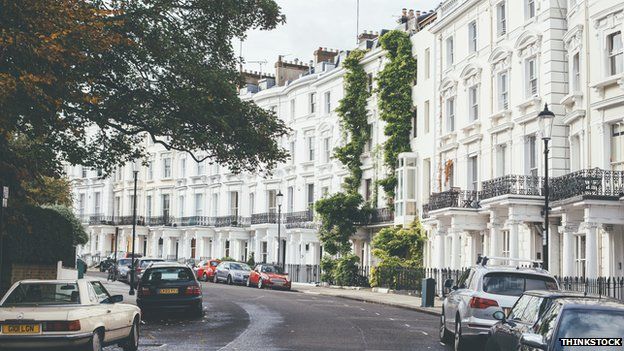Cameron clean-up plan won't stop dirty money, say critics
- Published

David Cameron's plans to crack down on "dirty money" being used to buy UK property have been criticised by tax and property experts.
Later this year, the Land Registry in England and Wales will have to publish the names of all property owners, the prime minister announced.
Up to now, it has only been obliged to publish details of the legal owners of a property - who can be trustees.
But experts say the change will do little to help catch criminals.
"There is a ridiculous presumption that criminals follow the rules," said offshore tax expert Mark Davies.
"If Mr Big wants to hide laundered money and he wants this to remain hidden, he will simply have someone else named as the owner of the property," said Mr Davies.
Ownership
However, Mr Cameron insisted the measures could make a real difference.
"We need to stop corrupt officials or organised criminals using anonymous shell companies to invest their ill-gotten gains in London property," he said in Singapore.
According to Transparency International, £122bn of property in England and Wales is owned by offshore companies.
Mr Cameron highlighted the case of Nigerian fraudster James Ibori, who was jailed for 13 years in 2012.
He owned properties in St John's Wood, Hampstead, Regent's Park and Dorset.
The prime minister also said there would be a consultation on increasing transparency further.
This could involve the rules on declarations of who owns UK companies being extended to cover foreign companies too.
Legitimate reasons
One senior London estate agent was cynical about plans to get the industry to help uncover international fraud.
"I believe the government is asking too much of agents to try to detect highly sophisticated fraud," said Jeremy Leaf, former residential sales chairman of the Royal Institution of Chartered Surveyors (Rics).
"Reporting suspicious behaviour among homeowners is one thing, but identifying dodgy signals in complex company structures is quite another," he said.
Other industry experts welcomed the announcement by Mr Cameron, saying the measures would help lawyers and estate agents to identify the real owners of property.
"We will still be reliant upon the people and firms who deal with these individuals to ask the right questions and to report their suspicions, but transparency of ownership is a significant step which supports this," said Neal Dawson, UK head of anti-money laundering and sanctions at KPMG.
"There will still be challenges, especially where assets are held or controlled by nominees acting on behalf of the true owner, but these situations should become easier to spot," he added.
- Published25 July 2015
- Published28 July 2015